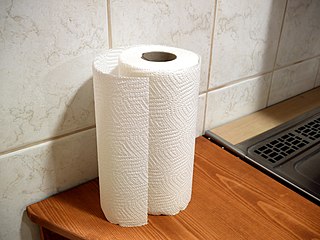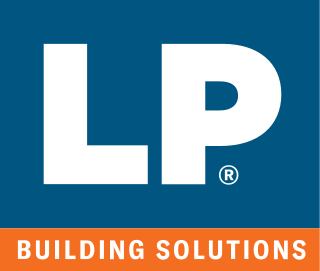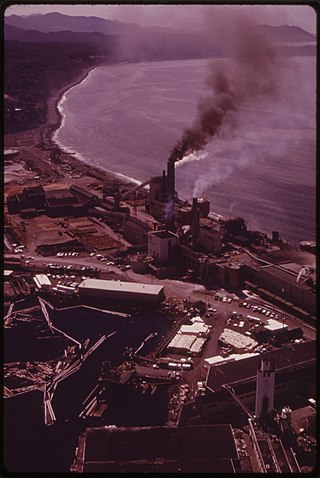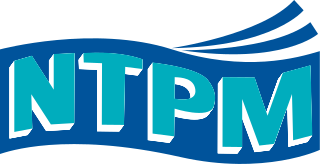
Camas is a city in Clark County, Washington, with a population of 26,065 at the 2020 census. The east side of town borders the city of Washougal, Washington, and the west side of town borders Vancouver, Washington. Camas lies along the Washington side of the Columbia River, across from Troutdale, Oregon, and is part of the Portland metropolitan area.

Kimberly-Clark Corporation is an American multinational consumer goods and personal care corporation that produces mostly paper-based consumer products. The company manufactures sanitary paper products and surgical & medical instruments. Kimberly-Clark brand name products include Kleenex facial tissue, Kotex feminine hygiene products, Cottonelle, Scott and Andrex toilet paper, Wypall utility wipes, KimWipes scientific cleaning wipes and Huggies disposable diapers and baby wipes.

The Scott Paper Company was the world's largest manufacturer and marketer of sanitary tissue products with operations in 22 countries. Its products were sold under a variety of well-known brand names, including Scott Tissue, Cottonelle, Baby Fresh, Scottex and Viva. Consolidated sales of its consumer and commercial products totalled approximately $3.6 billion in 1994.
Koch Industries, Inc. is an American multinational conglomerate corporation based in Wichita, Kansas, and is the second-largest privately held company in the United States, after Cargill. Its subsidiaries are involved in the manufacturing, refining, and distribution of petroleum, chemicals, energy, fiber, intermediates and polymers, minerals, fertilizer, pulp and paper, chemical technology equipment, cloud computing, finance, raw materials trading, and investments. Koch owns Flint Hills Resources, Georgia-Pacific, Guardian Industries, Infor, Invista, KBX, Koch Ag & Energy Solutions, Koch Engineered Solutions, Koch Investments Group, Koch Minerals & Trading, and Molex. The firm employs 122,000 people in 60 countries, with about half of its business in the United States.

UPM-Kymmene Oyj is a Finnish forest industry company. UPM-Kymmene was formed by the merger of Kymmene Corporation with Repola Oy and its subsidiary United Paper Mills Ltd in 1996. UPM consists of six business areas: UPM Fibres, UPM Energy, UPM Raflatac, UPM Specialty Papers, UPM Communication Papers and UPM Plywood. The Group employs around 17,000 people and it has production plants in 11 countries. UPM shares are listed on the NASDAQ OMX Helsinki stock exchange. UPM is the only paper company which is listed in the global Dow Jones Sustainability Index and also a member of the United Nations Global Compact organization.
The United States is one of the biggest paper consumers in the world. Between 1990 and 2002, paper consumption in the United States increased from 84.9 million tons to 97.3 million tons. In 2006, there were approximately 450 paper mills in the United States, accounting for $68 billion.

A paper towel is an absorbent, disposable towel made from paper. In Britain, paper towels for kitchen use are also known as kitchen rolls, kitchen paper, or kitchen towels. For home use, paper towels are usually sold in a roll of perforated sheets, but some are sold in stacks of pre-cut and pre-folded layers for use in paper-towel dispensers. Unlike cloth towels, paper towels are disposable and intended to be used only once. Paper towels absorb water because they are loosely woven, which enables water to travel between the fibers, even against gravity. They have similar purposes to conventional towels, such as drying hands, wiping windows and other surfaces, dusting, and cleaning up spills. Paper towel dispensers are commonly used in toilet facilities shared by many people, as they are often considered more hygienic than hot-air hand dryers or shared cloth towels.

Louisiana-Pacific Corporation (LP) is an American building materials manufacturer. The company was founded in 1973 and LP pioneered the U.S. production of oriented strand board (OSB) panels. Currently based in Nashville, Tennessee, LP is the world's largest producer of OSB and manufactures engineered wood building products. LP products are sold to builders and homeowners through building materials distributors and dealers and retail home centers.

The recycling of paper is the process by which waste paper is turned into new paper products. It has a number of important benefits: It saves waste paper from occupying homes of people and producing methane as it breaks down. Because paper fibre contains carbon, recycling keeps the carbon locked up for longer and out of the atmosphere. Around two-thirds of all paper products in the US are now recovered and recycled, although it does not all become new paper. After repeated processing the fibres become too short for the production of new paper, which is why virgin fibre is frequently added to the pulp recipe.

Tissue paper or simply tissue is a lightweight paper or, light crêpe paper. Tissue can be made from recycled paper pulp on a paper machine.

Catalyst Paper Corporation is a pulp and paper company based in Richmond, British Columbia. It operates five pulp mills and paper mills, producing a combined 1.8 million tonnes of paper and 491,000 tonnes of market pulp annually. The mills mostly produce magazine paper and newsprint.
Gaylord Container Corporation was an American integrated manufacturer of packaging materials, primarily corrugated containers. Operating from 1986 until 2002, most of the company's facilities were originally part of Crown Zellerbach's container division. Based in Deerfield, Illinois, a suburb north of Chicago, Gaylord Container completed its initial public offering in July 1988 and was listed on the American Stock Exchange. After less than 16 years as a company, it was acquired by a competitor, Temple-Inland, in early 2002, which was acquired by International Paper a decade later in 2012.
In 1990, the Allied Paper, Inc./Portage Creek/Kalamazoo River in southwestern Michigan was declared by the Environmental Protection Agency (EPA) to be a Superfund site – in other words, an abandoned industrial site containing significant amounts of toxic waste. The EPA and companies responsible for the waste in this area, which includes a three-mile section of Portage Creek as well as part of the Kalamazoo River, into which it flows, are currently involved in an effort to reduce the amount of toxic waste at the site, which is contaminated by PCBs from paper mills and other factories.
Kruger Inc. is a Canadian private company which manufactures publication papers, lumber and other wood products, corrugated cartons from recycled fibres, green and renewable energy, and wines and spirits. Kruger Inc. operates facilities in Québec, Ontario, British Columbia, Newfoundland and Labrador, and the United States. KP Tissue, Inc. is a separate, publicly traded holding company, headquartered in Mississauga, Ontario, Canada.

The environmental impact of paper are significant, which has led to changes in industry and behaviour at both business and personal levels. With the use of modern technology such as the printing press and the highly mechanized harvesting of wood, disposable paper became a relatively cheap commodity, which led to a high level of consumption and waste. The rise in global environmental issues such as air and water pollution, climate change, overflowing landfills and clearcutting have all lead to increased government regulations. There is now a trend towards sustainability in the pulp and paper industry as it moves to reduce clear cutting, water use, greenhouse gas emissions, fossil fuel consumption and clean up its influence on local water supplies and air pollution.
Clearwater Paper Corporation is a pulp and paper product manufacturer that was created on December 9, 2008, via a spin-off from the real estate investment trust (REIT) company Potlatch Corporation. With its headquarters in Spokane, Washington, the new company started with four locations for the manufacture of bleached paperboard, consumer tissue, and wood products.

The Allied Paper Corporation was created in 1921 by a merger of three paper mills in Kalamazoo and Otsego, both in South-West Michigan, USA. The company grew steadily over the next 40 years but when local forests had been logged off and when profits could no longer support further investments and updates it became uncompetitive. Allied mills were closed or sold during the 1970s and 1980s, and the corporation passed into history during 1988. Hundreds of millions of dollars have since been spent in South West Michigan cleaning up the last Allied Paper mill site and the PCB pollution caused by this company.

Crown Zellerbach was an American pulp and paper conglomerate based in San Francisco, California, purchased in a hostile takeover in 1985. Most of its pulp and paper assets were sold to James River Corporation, now part of Georgia-Pacific.

James River Corporation was an American pulp and paper company based in Richmond, Virginia, once the largest paper manufacturer in the world.

Nibong Tebal Paper Mill Holdings Bhd. is a Malaysian multinational pulp and paper and consumer goods company and is one of the world's largest paper manufacturer. Headquartered in Nibong Tebal, Penang, the company produces more than 100 types of tissue papers and has a capacity to produce 250 tons of tissue paper per day. Nibong Tebal Paper Mill has a strong presence not only in Malaysia, but also in Singapore, Indonesia, Thailand, and Vietnam.


















